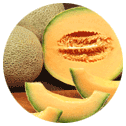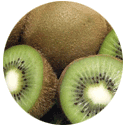Tomato Health Benefits And Nutrition Values
There are thousands of tomato varieties. The most commonly available varieties are: cherry, plum, and slicing tomatoes. A new sweet variety which is like the cherry tomato is the grape tomato; it is tasty to eat alone or in a salad. Cold temperatures spoil tomatoes, so do not buy tomatoes that are stored in a cold area. Choose plump tomatoes with smooth skins that have no bruises, cracks, or blemishes. Depending on the variety, ripe tomatoes will be completely red or reddish-orange. Tomatoes should be stored at room temperature (above 55 degrees) until they have fully ripened.

Nutrient |
Amounts/Selected Serving |
DV% |
|---|---|---|
Calcium |
14.9mg |
1% |
Iron |
0.4mg |
2% |
Magnesium |
16.4mg |
4% |
Phosphorus |
35.8mg |
4% |
Potassium |
353mg |
10% |
Sodium |
7.5mg |
|
Zinc |
0.3mg |
2% |
Copper |
0.1mg |
4% |
Manganese |
0.2mg |
8% |
Selenium |
- |
|
Fluoride |
3.4mcg |
~ |
Nutrients |
Amounts/Selected Serving |
DV% |
|---|---|---|
Calories |
26.8(112 kJ) |
1% |
Carbohydrate |
21.1(88.3 kJ) |
~ |
Fat |
2.5(10.5 kJ) |
~ |
Protein |
3.2(13.4 kJ) |
~ |
Alcohol |
0.0(0.0 kJ) |
~ |
Nutrients |
Amounts/Selected Serving |
DV% |
|---|---|---|
Cholesterol |
0.0mg |
0% |
Phytosterols |
10.4mg |
~ |
Nutrients |
Amounts/Selected Serving |
DV% |
|---|---|---|
Total Fat |
0.3g |
0% |
Saturated Fat |
0.0g |
0% |
Monounsaturated Fat |
0.0g |
~ |
Polyunsaturated Fat |
0.1g |
~ |
Total trans fatty acids |
~ |
~ |
Total trans-monoenoic fatty acids |
~ |
~ |
Total trans-polyenoic fatty acids |
~ |
~ |
Total Omega-3 fatty acids |
4.5mg |
~ |
Total Omega-6 fatty acids |
119mg |
~ |
Nutrient |
Amounts/Selected Serving |
DV% |
|---|---|---|
Vitamin A |
1241IU |
25% |
Vitamin C |
18.9mg |
32% |
Vitamin D |
~ |
~ |
Vitamin E(AlphaTocopherol) |
0.8mg |
4% |
Vitamin K |
11.8mg |
15% |
Thiamin |
0.1mg |
4% |
Riboflavin |
0.0mg |
2% |
Niacin |
0.9mg |
4% |
Vitamin B6 |
60.1mg |
6% |
Folate |
22.3mcg |
6% |
Vitamin B12 |
120.0mcg |
0% |
Pantothenic Acid |
0.1mg |
1% |
Choline |
10.0mg |
~ |
Betaine |
0.1mg |
~ |
Nutrients |
Amounts/Selected Serving |
DV% |
|---|---|---|
Total Carbohydrate |
5.8g |
2% |
Dietary Fiber |
1.8g |
7% |
Starch |
0.0g |
~ |
Sugars |
3.9g |
~ |
Nutrients |
Amounts/Selected Serving |
DV% |
|---|---|---|
Protein |
1.3g |
3% |
Nutrients |
Amounts/Selected Serving |
DV% |
|---|---|---|
Alcohol |
0.0g |
~ |
Water |
141g |
~ |
Ash |
0.7g |
~ |
Caffeine |
0.0mg |
~ |
Theobromine |
0.0mg |
~ |
- Lower Cholestrol
- Reduce Heart Disease
- Lower Blood Pressure
- Protection from cell Damage
- Regulates Blood Sugar
- Counteract Acidosis
- Reduce Migraines
- Boost Immunity
- Natural Unscreen
- Strenghten Bones
- Treatment of Vasolidation
- Lead Toxicity
- Eye Disorder
- Cancer
- Combating Stroke
- Mood
- Wound Repair
- Diabetes
A Tomato- cholesterol free and a good source for diet; it won’t add cholesterol to the diet. A cup of tomato provides 9% of fiber that helps you to lower the high cholesterol levels. Tomatoes also contains niacin (vitamin B3), which has been used as a safe way to lower cholesterol levels.
Tomatoes are good source of potassium that have been shown to lower high blood pressure and reduce risk of heart disease. Vitamin B6 and folate, present in tomatoes, are needed to the body to convert a dangerous chemical called homocysteine into other, benign molecules. High levels of homocysteine can directly damage blood vessel walls and are associated with an increased risk of heart attack and stroke.
The tomatoes provide significant drop in blood pressure. After 8 weeks, ongoing tracking of daily tomato ingestion (in the form of lycopene complex – a tomato extract) showed a drop in both the blood pressure top number (systolic) by 10 points and the bottom number (diastolic) by 4 points.
The tomatoes are excellent source of antioxidant lycopene. Antioxidants travel through the body, neutralizing dangerous free radicals that otherwise damage cells and cell membranes. Free radicals escalate the progression or severity of atherosclerosis, diabetic complications, asthma, and colon cancer. High intakes of lycopene have been shown to help reduce the risk or severity of all of these illnesses.
Tomatoes are an outstanding source of chromium that has been shown to help diabetic patients keep their blood sugar levels under control.
Acidosis, is a main cause of calcium loss, fatigue, headaches, sleeplessness, muscle aches, acne, eczema, arteriosclerosis, sexual dysfunction, hormone imbalance, depression, and degenerative conditions. Our bodies are designed to maintain an alkaline balance with a pH of 7.365.By including plenty of alkaline minerals in our diets – calcium, magnesium, potassium and sodium – we help our body maintain its alkaline balance naturally. Tomatoes are excellent sources of calcium, magnesium, and potassium and can aid in preventing acidosis.
Tomatoes are an outstanding source of riboflavin, which helps for reducing the migraine attacks.
Due to consumption of tomatoes helps to avoid flu and colds, especially for males. These common illnesses are widely believed to be rooted in carotenoid deficiencies, including low amounts of lycopene and beta carotene in our body. Drinking tomato juices assists in building defenses against colds and flu.
It has been showing that lycopene in tomatoes works as a natural sunscreen and provide protection against UV rays.
A serving of tomatoes provide 18% the daily value of vitamin K, which promotes bone health. Vitamin K activates osteocalcin, the major non-collagen protein in bone. Osteocalcin mineralizes calcium molecules inside of the bone.
Vitamin C has effectively resulted in proper dilation of blood vessels in the cases of atherosclerosis, congestive heart failure, high cholesterol, angina pectoris, and high blood pressure. It has been found that supplements of vitamin C improve blood vessel dilation.
Lead Toxicity is a severe health problem found in children, especially in the urban areas. Abnormal development and growth has been found in children who are exposed to lead. They develop behavioral problems, learning disabilities and have low IQ. It may damage the kidney and increase blood pressure in adults. Vitamin C supplements reduce the blood lead level. Hence by intake of tomato lead toxicity can be reduced among the childrens. Hence tomato has rich in vitamin c due to this it can able to lower this risk factor.
Cataracts are the most common causes of visual problems. Decrease in the level of vitamin C in the lens of the human eye leads to increased number of cataracts. Increase of vitamin C in tomato intake increases the blood supply to the visual zones of the body and helps to cure this eye disorder.
It has been found that high consumption of fresh vegetables and fruits have a linkage with a minimized risk for the various types of cancer. The increased consumption of vitamin C is connected with the decreased possibilities of cancers of lung, mouth, vocal chords, throat, colon-rectum, stomach, and esophagus the fruits such as tomato, orange, pomegranate are highly rich in vitamin c.
Vitamin C in tomato or Ascorbic Acid helps in reducing the risk of stroke, a kind of cardiovascular disease. A diet full of vegetables and fruits produces good quantity of vitamin C which maintains the appropriate blood pressure level. It also protects the body from free radicals which could be the reason for the stroke.
Vitamin C present in the tomato plays a key role in the production of neurotransmitters, norepinephrine. If vitamin c is less then they can affect the mood of a person and are critical to the proper functioning of the brain.
Due to intake correct amount of tomato per day the Vitamin C present in it helps to repair wounds in the body. It facilitates the growth of the connective tissues that helps in the process of healing of wounds from our body.
One of the main reasons for diabetes is the deficiency of vitamin C in our body. Supplements of vitamin C are beneficial to cure the diabetes as they help in processing of insulin and glucose. It can be cured by regular intake of vitamin c.
PERSON WHOM MAY NOT CONSUME TOMATO:
- Gastrointestinal Side Effect
- Kidney Stones
Tomatoes are acidic in nature, so intake of too many of them can lead preexisting medical conditions, such as gastroesophageal reflux disease, or GERD, also known as acid reflux -- a condition in which the digestive acids in your stomach rise and leak through the muscle acting as a valve between your stomach and esophagus, burning your esophagus .The seeds in tomatoes can also aggravate diverticulitis, by lodging in the diverticula, small pouches formed in your digestive tract, causing inflammation and infection.
The overdose on vitamins and nutrients can be possible when eat large amounts of tomatoes in high concentrations. One medium-size tomato contains 1,025 IU of vitamin A. If you eat 10 tomatoes per day, would exceed vitamin A upper limit, which could lead to nausea and headache. A medium tomato also contains around 17 mg of vitamin C, about a tenth of your upper limit. Eating too many tomatoes and causing a vitamin C overdose might lead to the development of kidney stones.
















